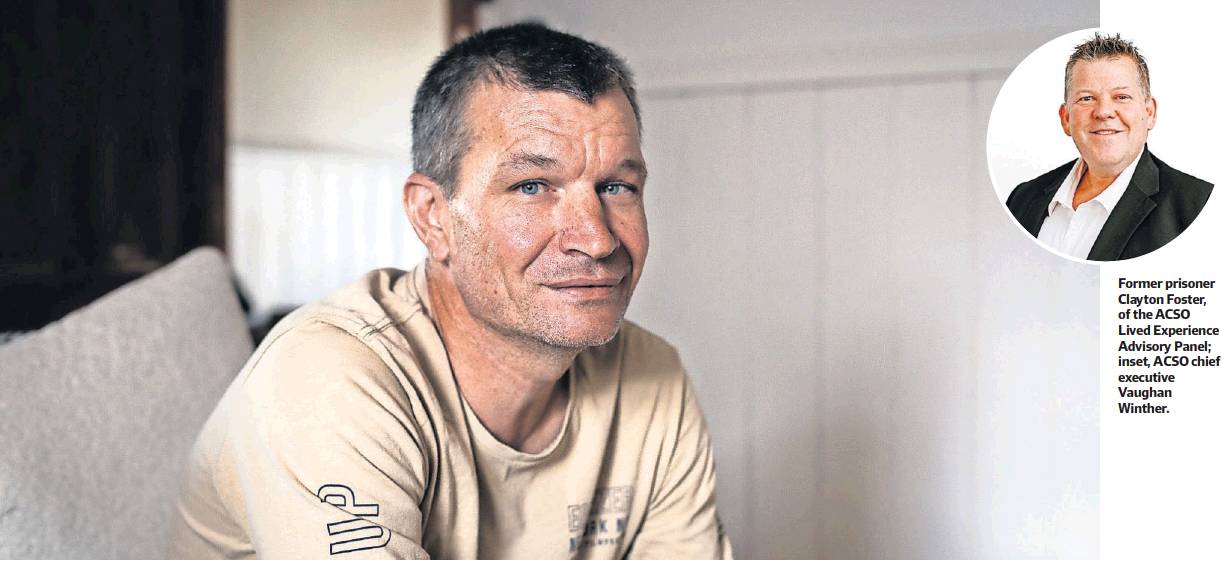Support key to breaking the prison cycle
Two years ago, Clayton Foster was partway through serving a 14-year sentence in a Victorian prison, the sixth term he had served in a 20-year cycle in and out of prison, with little hope of parole.
He says if it wasn’t for the support of a not-for-profit organisation called the Australian Community Support Organisation (ACSO), he would probably still be inside today.
“When I was in prison, there were some compulsory therapy courses you had to do before the parole board would consider your case. But for me, they weren’t useful,’’ Foster says. ‘‘The support I got on the outside is what has changed everything for me. I can proudly say that I’m no longer a recidivist due to the help ACSO gave me.”
ACSO has a focus on diverting or reintegrating people from prison through a range of community programs, which includes mental health, alcohol and other drug treatment, casework, housing, and intensive residential support for people with cognitive disability. It is a service that is picking up just a fraction of the people who fall through the gaps once they are released from prison.
This kind of support is a critical step that is missing from the criminal justice system, says ACSO chief executive Vaughan Winther, and its absence is resulting in rising incarceration rates and people ending up in prison who should not be there.
“Most people think the prison system’s full of very bad people and it is just not the case. The majority of people that make up the prison system are homeless, have a cognitive impairment, untreated mental illness and substance abuse issues – and 50 per cent of them will reoffend once they have been released, primarily because there is no integration of support services for them in the community,” says Winther.
According to a report by the Productivity Commission, Australia’s Prison Dilemma, more than 40,000 Australians were in prison in 2020. However, many more flow through the system each year, with more than one third on remand waiting for trial or sentencing. And nearly 60 per cent have been in prison before.
“Australian jurisdictions across the board have increased incarceration rates over the past decade and this means there are people that are ending up in custody who just shouldn’t be there,’’ says Winther. ‘‘Prisons have become more expensive and less effective at rehabilitation, [these people] should be in the community and there should be more support for them.”
Winther points to the economic argument of imprisonment – according to the Productivity Commission research, prisons are expensive, costing Australian taxpayers more than $5 billion a year, or more than $330 per prisoner per day.
“The logical starting point would be to cease building more prisons and redirect this funding to creating alternatives to remand,’’ says Winther. ‘‘Community-based treatment and support for people with multiple and complex needs is far more cost effective and successful compared to incarceration in high-security remand prisons.”
Supportive housing is a concept that can address the problem, says Dr Danny Sullivan, an ACSO board director and forensic psychiatrist working in a senior role in public mental health in Victoria.
He says that in the coming years, governments will need strong collaboration with the not-for-profit sector, as well as investment from private enterprise and the corporate sector, to meet the challenges of how to reduce the economic costs and social harms of the criminal justice system.
The supportive housing model is just one that will be part of a discussion on ‘Innovation in Preventing Incarceration’, one of the key themes of this year’s International Criminal Justice Conference, to be held in Melbourne on November 22-24.
“There are insufficient resources available in community settings to provide for people with mental health disorders or impairments, and in particular supported accommodation, which can reduce instability and consequent risk of offending,’’ says Sullivan. ‘‘ACSO is really clear on supportive housing being the answer to ensure people get the right services they need at the right time.”
Foster is a case in point. With the help of ACSO, he successfully completed parole and is now a member of the ACSO Lived Experience Advisory Panel, using his experience to raise awareness of what is needed to break the cycle for vulnerable people caught in a loop of crime and punishment.
“When I first went to prison in 1995 the rules were a lot different,’’ Foster says.
‘‘You didn’t ask for help. It’s changed a bit but we need more investment so success stories can go back in and talk to other prisoners and show them there is support out there and they can break the cycle, too.”
